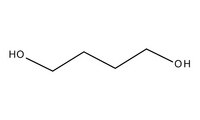801532 Sigma-Aldrich1,4-Butanediol
1,4-Butanediol for synthesis. CAS 110-63-4, chemical formula HO(CH₂)₄OH.
More>> 1,4-Butanediol for synthesis. CAS 110-63-4, chemical formula HO(CH₂)₄OH. Less<<Synonyms: 1,4-Butylene glycol
Recommended Products
Overview
| Replacement Information |
|---|
Key Spec Table
| CAS # | EC Number | Hill Formula | Chemical Formula | Molar Mass |
|---|---|---|---|---|
| 110-63-4 | 203-786-5 | C₄H₁₀O₂ | HO(CH₂)₄OH | 90.12 g/mol |
Products
| Catalogue Number | Packaging | Qty/Pack | |
|---|---|---|---|
| 8015322500 | Glass bottle | 2.5 l | |
| 8015329025 | Plastic container | 25 l |
| Description | |
|---|---|
| Catalogue Number | 801532 |
| Synonyms | 1,4-Butylene glycol |
| Description | 1,4-Butanediol |
| References |
|---|
| Product Information | |
|---|---|
| CAS number | 110-63-4 |
| EC number | 203-786-5 |
| Hill Formula | C₄H₁₀O₂ |
| Chemical formula | HO(CH₂)₄OH |
| Molar Mass | 90.12 g/mol |
| HS Code | 2905 39 28 |
| Structure formula Image | |
| Quality Level | MQ200 |
| Applications | |
|---|---|
| Application | 1,4-Butanediol for synthesis. CAS 110-63-4, chemical formula HO(CH₂)₄OH. |
| Biological Information |
|---|
| Dimensions |
|---|
| Materials Information |
|---|
| Toxicological Information | |
|---|---|
| LD 50 oral | LD50 Rat 1525 mg/kg |
| LD 50 dermal | LD50 Rabbit > 2000 mg/kg |
| Safety Information | |
|---|---|
| Categories of danger | harmful |
| Product Usage Statements |
|---|
| Storage and Shipping Information | |
|---|---|
| Storage | Store below +30°C. |
| Packaging Information |
|---|
| Transport Information |
|---|
| Supplemental Information |
|---|
| Global Trade Item Number | |
|---|---|
| Catalogue Number | GTIN |
| 8015322500 | 04022536367590 |
| 8015329025 | 04027269144296 |








